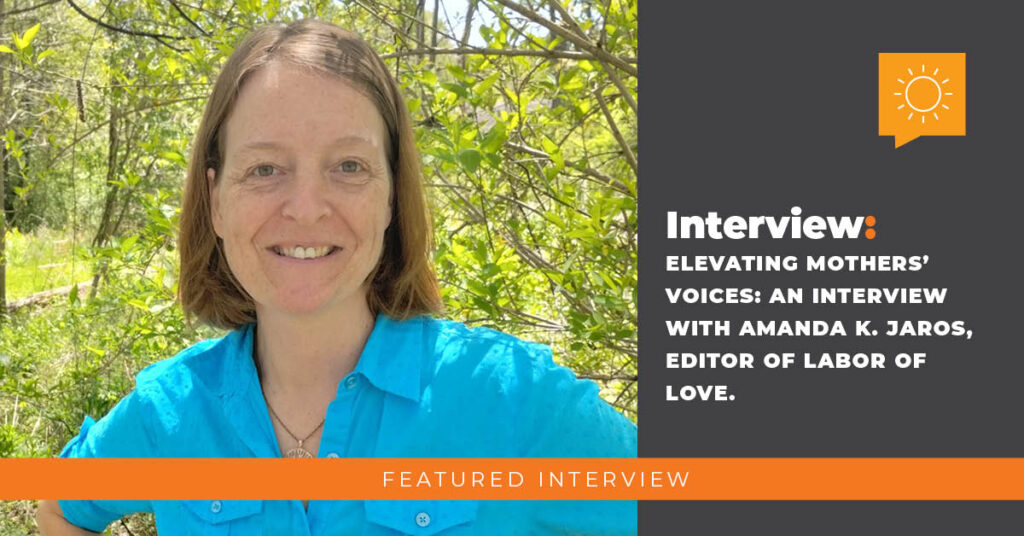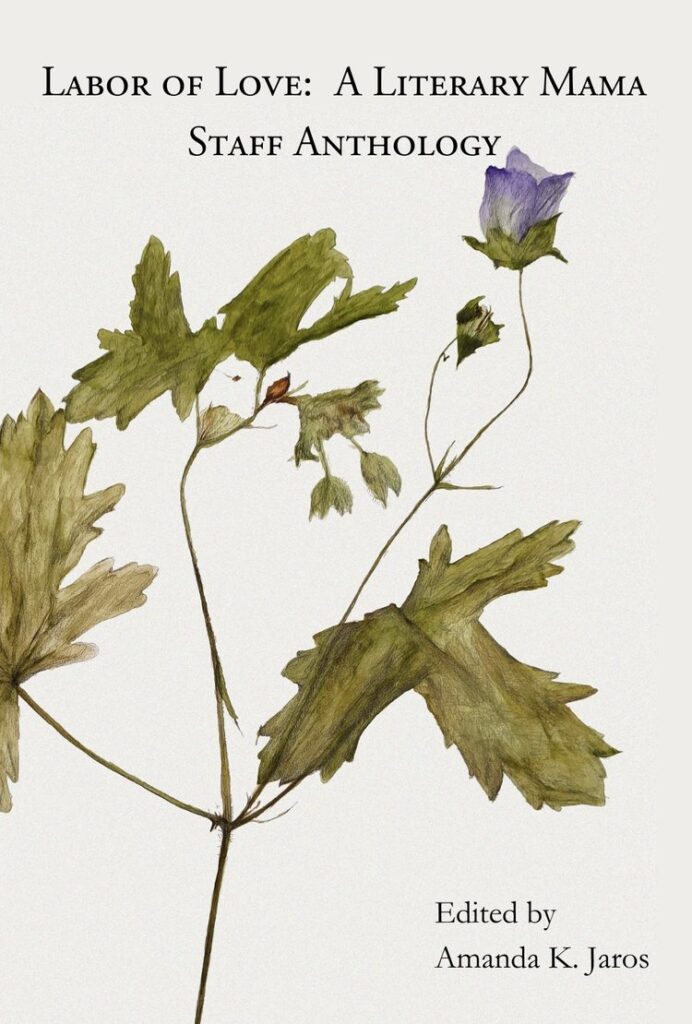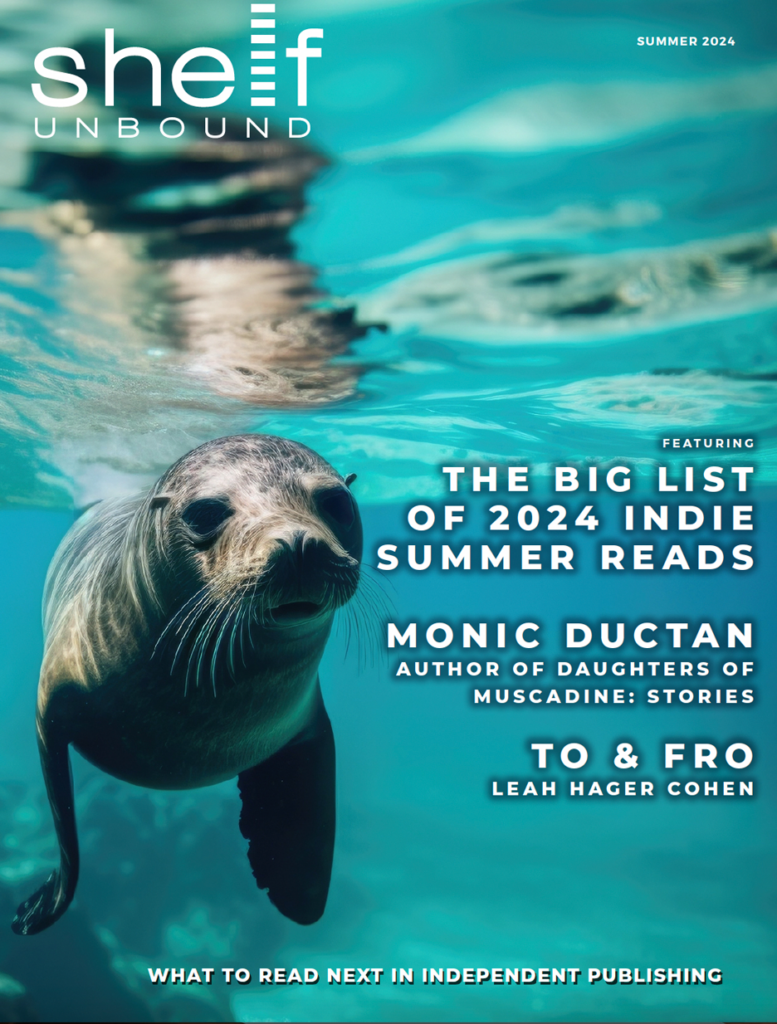By Christina Consolino

Freelance writer and editor Amanda K. Jaros has a strong connection to the online journal Literary Mama. She started there as a blog editor and eventually worked her way up the editorial ladder to editor-in-chief. During that time, she helped give voice to countless mothers who wanted to share their wisdom and stories. Amanda recently took on the role of curating works for Labor of Love: A Literary Mama Staff Anthology, which celebrates the journal and staff as well as motherhood and the people who experience it.
You were involved with Literary Mama in an editorial capacity for over 11 years. What first drew you to the journal and what kept you there?
AJ: When I first found Literary Mama, my son was about six, and I was struggling to find a community of moms as well as a community of writers. I felt new to both worlds. I had been writing a mom blog for a while when I discovered the LM blog. I loved the literary focus combined with the motherhood focus, and I knew I had found a place to settle in. As I grew into my life as a mom and a writer, I started to see how both roles are so undervalued in our society, and thus how important it is to elevate mothers’ and artists’ voices. I’m a fairly ambitious person, and I just kept wanting to do more for both the LM journal and the community as a whole. And of course, the women I worked with, these other dedicated and passionate mother writers and editors, were and are very important to me.
So much has changed in the technological world since Literary Mama first came on the scene in 2023. What changes did you see during your tenure there? How difficult is it for a journal to adapt to changes?
AJ: The journal is so technologically different from what it was! When I came on, the journal was on its second website iteration, which had no capacity for images. It has gone through two major renovations since then, as well as a staff-wide migration to Google products. What has always been a struggle for Literary Mama is that we have so many departments with volunteer editors coming together from all over the world, and editors often get siloed into their niche. As volunteers, we can set standards and encourage best practices, but there is no real “boss” to tell folks what to do. The flip side of that, however, is that everyone who gives their time to LM brings their own unique flair, energy, and expertise to the journal, which makes it a wonderfully evolving entity.
Speaking of changes—how has your perspective of motherhood changed since you joined the journal?
AJ: My son is about to graduate high school, so I’d say my perspective has changed a lot! I’m at the point now where I am having to let go of him and trust that I did a good job as a mother and that he will go out into the world and do wonderful things. I didn’t fully understand it before, but it really is true that our children are not ours to keep. We get them for a short time until they become their own independent selves. It’s a heart wrenching and beautiful transition of life.
You recently published Labor of Love: A Literary Mama Staff Anthology, which celebrates twenty years of Literary Mama and features fiction and nonfiction from former staff. How did you decide to embark on this project? Did you have any reservations?
AJ: Simply, I wanted to make a book. But I also wanted to celebrate the many wonderful volunteer editors who started and kept LM going all those years. I felt they deserved to be recognized with a chance to share their own writing. I was excited about almost every aspect of the project. My sole reservation was how to undertake the actual publishing/printing. Luckily, former LM poetry editor Allison Blevins reached out to offer collaboration with her indie press Small Harbor Publishing. Working with Small Harbor took the technical aspects out of my hands and let me focus on working with the writers, for which I was grateful.
What did you learn from the project as a whole? What did you learn from working with writers to edit the included pieces?
AJ: I always enjoyed editing writers’ work with the journal, but in later years, after I left the LM creative nonfiction department, I got pretty entrenched in the administration of the journal. That’s fulfilling in its own way, but very different from reading someone’s writing and working with them to explore, enhance, or develop it. Putting together an anthology allows one to read such a broad range of styles and topics. I loved it when a new piece came in and I sat down to discover what it was all about. I remembered how much I love the editorial process, and it inspired me to try to expand my editorial business.
The book is divided into four sections. How did you decide on those sections and which pieces belonged together?
AJ: I played around with various ways to divide the book. I wanted it to be more dynamic than by genre or topic. There were a surprising number of pieces about the various transitions mothers and families go through, such as kids leaving the nest. There were also several that reflected on the past, family legacies, and histories. The pieces seemed to come together naturally into a past, present, and future kind of format. And the more I moved things around, the more it made sense. At least, it made sense to me! I hope it does for readers as well!
Literary Mama the journal “believes that all mothers have a story worth sharing and honors the many faces of motherhood by publishing work that celebrates the journey as well as the job.” The pieces in the anthology also honor the diverse and multifaceted nature of motherhood. Can you comment on that?
AJ: There is quite a range of human stories in this book. That’s what I was hoping for. No two mothers have the same experience, so reading about other people’s worlds can open us up to new ideas. And yet, I also hope that readers find a story or poem that speaks to them, that they can see themselves in and know that even if their life looks a bit different, there is someone out there going through something similar. That said, I do think there are a lot of stories not included here– stories of grandmothers, stepmothers, adoptive mothers, trans mothers, and many others that I would love to read. I worked with the pieces that came in and was grateful for the varied and thoughtful perspectives that these mothers shared.
What message do you hope this anthology sends to readers?
AJ: In addition to the above, I hope this book helps elevate the voices and experiences of mothers. Mothers do hard work every single day, with, often, so little support or compassion from our society. I hope mothers read this and find camaraderie, but I also hope fathers and single people and people without kids read this and understand a little more deeply what it is to be a mother.
Editing a book is sometimes compared to growing and birthing a baby. Was it easier or more difficult than expected? Did anything surprise you along the way?
AJ: I’m not a particularly patient person, so the hardest part was how long everything took. From giving writers enough time to create their best work to the very long publication process, I always wanted it to go faster. The entire project was a wonderful learning experience, and a chance for me to slow down and focus on each step in the process. Good things, whether a baby or a book, take time.
What are you working on now?
AJ: I’m currently in the final production stage of my travel guide 100 Things to Do in Ithaca Before You Die, from Reedy Press. That will be released in September 2024 and will entail a lot of events around the Ithaca area where I live. I’m also finalizing my manuscript In My Boots: A Memoir of Five Million Steps Along the Appalachian Trail, which is scheduled for release February 2025 with Black Rose Writing. I have a couple other creative nonfiction works in the percolator, including another motherhood anthology idea. Mostly, though, I’m trying to gently usher my teenage son to the next phase of his life, as I, too, figure out how to transition into a new stage of motherhood.

The essays, poems, and stories in Labor of Love explore the depth and breadth of what it means to mother. Literary Mama celebrates mothers and the work they do caring for their families, from soothing tears to playing on the beach to teaching independence. For twenty years, Literary Mama has published the best writing for and by mothers, and this anthology shines the spotlight on the staff who keep the journal going, offering them space to share their own stories. With insight and grace, the mothers gathered here consider challenges like coping with their children’s or their own illnesses, adjusting to divorce, caring for their aging mothers, and encouraging teenage children to leave the nest. A collection that revolves around themes of girlhood, legacy, empowerment, and transition, Labor of Love is a testament to the strength and dedication of mothers, writers, and all those who mother.

Continue Reading…
Article originally Published in the Summer 2024 Issue: Indie Summer Reads.
